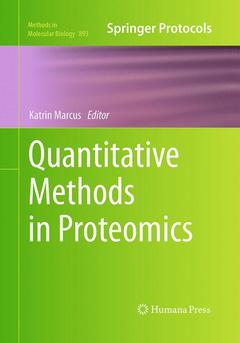Description
Quantitative Methods in Proteomics, 2012
Methods in Molecular Biology Series, Vol. 893
Language: English
Subject for Quantitative Methods in Proteomics:
Support: Print on demand
539 p. · 17.8x25.4 cm · Paperback
Description
/li>Contents
/li>Comment
/li>
Protein modifications and changes made to them, as well as the quantities of expressed proteins, can define the various functional stages of the cell. Accordingly, perturbations can lead to various diseases and disorders. As a result, it has become paramount to be able to detect and monitor post-translational modifications and to measure the abundance of proteins within the cell with extreme sensitivity. While protein identification is an almost routine requirement nowadays, reliable techniques for quantifying unmodified proteins (including those that escape detection under standard conditions, such as protein isoforms and membrane proteins) is not routine. Quantitative Methods in Proteomics gives a detailed survey of topics and methods on the principles underlying modern protein analysis, from statistical issues when planning proteomics experiments, to gel-based and mass spectrometry-based applications. The quantification of post-translational modifications is also addressed, followed by the ?hot? topics of software and data analysis, as well as various overview chapters which provide a comprehensive overview of existing methods in quantitative proteomics. Written in the successful Methods in Molecular Biology? series format, chapters include introductions to their respective topics, lists of the necessary materials and reagents, step-by-step, readily reproducible protocols, and notes on troubleshooting and avoiding known pitfalls.
Authoritative and easily accessible, Quantitative Methods in Proteomics serves as a comprehensive and competent overview of the important and still growing field of quantitative proteomics.
Important Issues in Planning a Proteomics Experiment – Statistical Considerations of Quantitative Proteomic Data.- The Whereabouts of 2D Gels in Quantitative Proteomics.- Proteome Analysis with Classical 2D-PAGE.- Fast and Sentitive Coomassie Staining in Quantitative Proteomics.- Silver Staining of 2D Electrophoresis Gels.- Differential Proteome Analysis using 2D-DIGE.- Quantitative Mass Spectrometry-Based Proteomics: An Overview.- Robust Workflow for iTRAQ-Based Peptide and Protein Quantification.- Relative Protein Quantification by MS/MS Using the Tandem Mass Tag Technology.- A Rapid Approach for Isobaric Peptide Termini Labeling (Rapid-IPTL).- ICPL – Isotope Coded Protein Label.- Hydroponic Isotope Labeling of Entire Plants (HILEP) and High Performance Mass Spectrometry For Quantitative Plant Proteomics.- In Vivo Quantitative Proteome Profiling: Planning and Evaluation of SILAC Experiments.- SILAC for the Study of Mammalian Cell Lines and Yeast Protein Complexes.- Post-Digestion 18O Exchange/Labeling for Quantitative Shotgun Proteomics of Membrane Proteins.- Application of Label Free Proteomics for Differential Analysis of Lung Carcinoma Cell Line A549.- Absolute Quantification (AQUA) of Proteins Using Standard Peptides and Multiple Reaction Monitoring (MRM).- Absolute Multiplexed Protein Quantification Using QconCAT Technology.- A Practical Guide to the FLEXIQuant Method.- Label-Free Protein Quantitation Using Weighted Spectral Counting.- Discovering the Phosphoproteome of the Hydrophobic Cytochrome c Oxidase Membrane Protein Complex.- Assay – A Quantitative Mass Spectrometry-Based Approach for Kinase Client Screening and Activity Analysis.- Robust and High-Throughput Sample Preparation for (Semi-)Quantitative Analysis of N-Glycosylation Profiles from Plasma Samples.- Quantitative Redox Proteomics – The NOxICAT Method.- Quantitative Analysis of S-Nitrosylated Proteins.- Analysis of Ubiquitinated Proteome by Quantitative Mass Spectrometry.-Identification of Endogenous SUMO1 Accepter Sites by Mass Spectrometry.- MSQuant: A Platform for Stable Isotope-Based Quantitative Proteomics.




